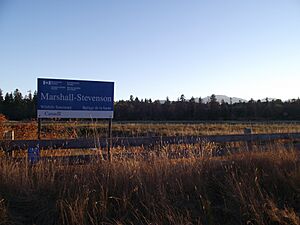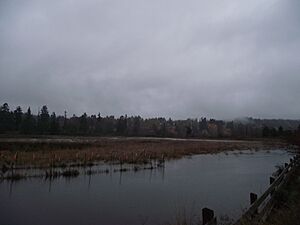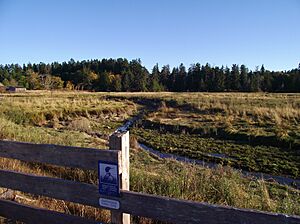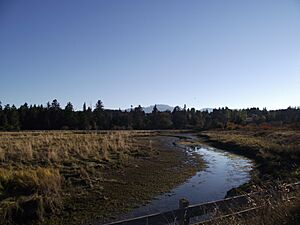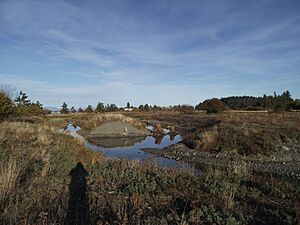Marshall-Stevenson Wildlife Sanctuary facts for kids
The Marshall-Stevenson Wildlife Sanctuary is a special natural area on Vancouver Island in British Columbia, Canada. It's located west of Qualicum Beach. This sanctuary is a type of wetland where land and water meet. It's a protected place, so public access is limited to keep it safe for wildlife.
A Look Back: History of the Sanctuary
This area was once part of a large farm called the Kinkade Farmstead. A settler named Thomas Kinkade farmed here in the late 1800s. Later, in 1974, the land was given to the Canadian government. Today, it is part of the Qualicum National Wildlife Area. This means it is protected and looked after by Environment Canada.
The sanctuary is also next to another protected area. This is the Little Qualicum River Estuary Regional Conservation Area. An estuary is where a river meets the sea. This area has 4.5 hectares (about 11 acres) of beach and estuary habitat. It's a very important place for nature.
Nature's Home: Ecology of the Wetlands
The wetland here is a tidal marsh. This means it gets water from both the Little Qualicum River and the Strait of Georgia. This mix of fresh and saltwater creates a rich ecosystem. Many different plants and animals live here.
For example, the marsh is a key place for salmon to lay their eggs. Many types of birds also depend on this area. These include migratory waterfowl like ducks, geese, and swans. Migratory birds travel long distances to find food and safe places. Other animals live here all the time. These include eagles, owls, egrets, deer, and otters.
Because the river flows into the Strait of Georgia, seals and sea lions (called pinnipeds) are also attracted to the area. They often come during salmon spawning season to find food.
However, there are some worries about the health of the marsh. Too many non-migratory Canada Geese can eat too much of the plants. Also, changes in water levels and how the river channels move can affect the marsh. It needs the right amount of tidal water to stay healthy.
Visiting the Sanctuary: Access and Views
There are no public walking trails directly into the Marshall-Stevenson Wildlife Sanctuary. This helps protect the sensitive wetland environment. However, there are good spots around the edges of the property where you can view the sanctuary.
From these viewing areas, you can also see some beautiful mountains. These include Mount Cokely and Mount Arrowsmith. It's a great place to observe nature from a distance.


